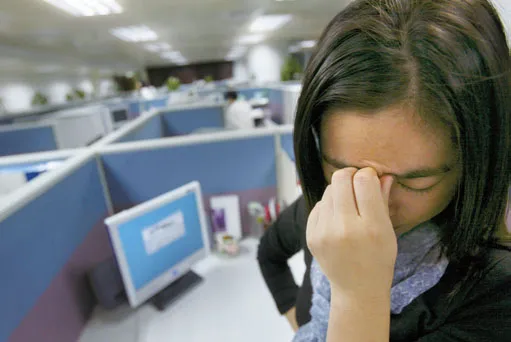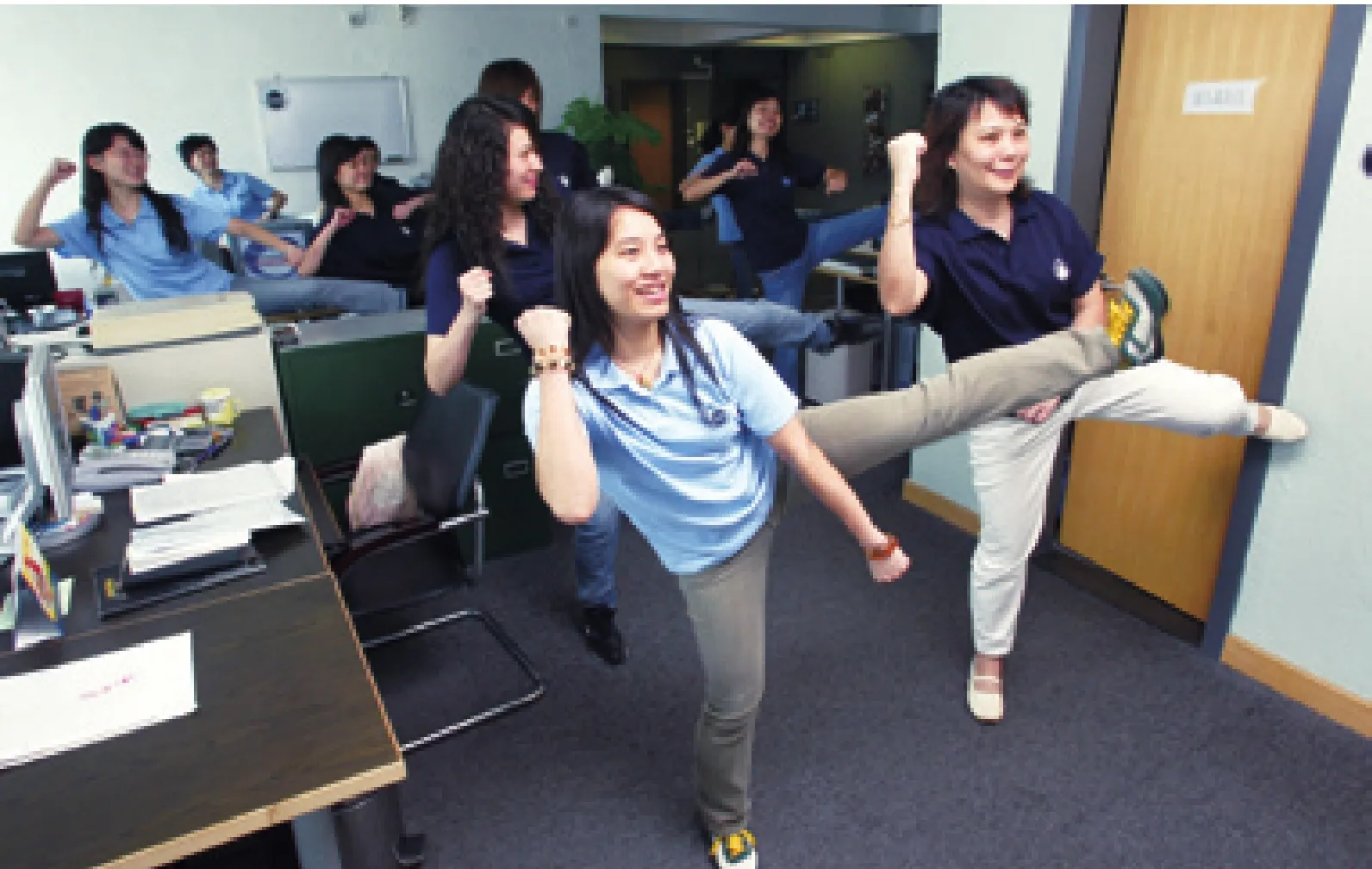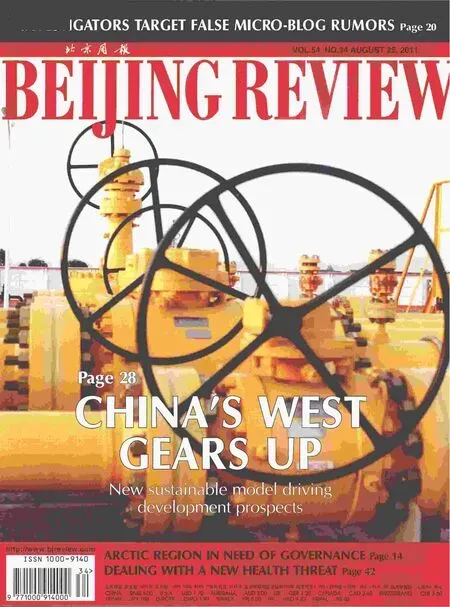NEW HEALTH PROBLEM LOOMS
2011-10-14ByTANGYUANKAI
By TANG YUANKAI
NEW HEALTH PROBLEM LOOMS
By TANG YUANKAI
A new type of illness rears its head among office workers

CFP
Chen Hong, a 37-year-old woman, works in an office in Beijing. She undergoes two physical examinations every year. Before a recent one, Chen felt a little nervous and thought there might be something wrong with her health. “For a long time, I had felt anxious and had trouble breathing. Sometimes, I was sweating and my eyes swelled. I felt no interest in anything. I couldn’t eat or sleep well. Even after a whole night of sleep, I felt exhausted. Sleeping helped nothing,” Chen said. But the recent examination’s results showed there was nothing wrong with Chen.
These symptoms indicate Chen is in subhealth conditions, said Wang Guowei, Vice President of Beijing Hospital of Traditional Chinese Medicine.
Sub-health, also called the third state, is a critical state between health and disease when all necessary physical and chemical indexes test negative by medical equipment, things seem normal but the person experiences all kinds of discomfiture and even pain, said the defnition by the World Health Organization (WHO).
Like Chen, people in this condition are not suffering from any organic or functional disease, but feel uncomfortable, fatigued, slow in response or unable to adapt, and are always in a state of anxiety, annoyance or helplessness, and are very tired of life.
The Chinese Medical Doctor Association, Chinese Hospital Association, Beijing Health Maintenance Organization and Beijing-based Ciming Health Checkup and Management Group Co. Ltd. jointly released a white paper on the health of Chinese offce workers early this year. The white paper shows 76 percent of office workers in the Chinese mainland were in sub-health conditions, and about 60 percent were overstrained last year. In the 35- to 50-year-old high-income group, biological ages were 10 years older than actual ages and 80 percent suffered from dietary disorders and sleeping disturbance. They felt tired almost every day. More than 20 percent ate fast food often; 54.4 percent did not have enough sleep; 46 percent seldom exercised. More than half easily felt anxious, 20 percent felt lonely and 70 percent felt unhappy and lacked satisfaction.
Causes of sub-health are various, but the rapid pace of modern life creating enormous pressure on office workers is to blame in most cases. “I almost live in the offce, work all the time and have no weekends, no personal life. The job has shaped my personality as the boss is pushing me hard and the competition is ferce,” Chen said. In addition to work, personal relations are another source of pressure and cause of sub-health. Chen and her peers have to take time off work attending to issues such as making sure children work hard to attain better grades, taking care of elderly parents, and comforting grumbling husbands or wives. With these burdens, their health could collapse at any time.
“I have never taken pressure seriously except one night when I woke up to go to the restroom, I found I couldn’t move my legs. I was really scared,” said Fan Nannan, a division manager in a bank in Beijing. “My husband sent me to the hospital. The doctor diagnosed my illness as temporal paralysis caused by the pressure of overwork.” Then, Fan became aware of the great pressures surrounding her: Endless meetings, various urgent reports, lots of coordination, as well as the need to be on time to pick up her son at school. She often doubts she could survive all these duties when they come upon her together.
Sub-health is now plaguing all age groups and agencies in China are greatly increasing research on the subject.
Such research has reached advanced in-ternational level in China. Shanxi Maternity and Child Health Hospital, Shanxi Medical University and Tongji Medical College of Huazhong University of Science and Technology, for instance, are building a platform for sub-health medical data miming technology, which is expected to provide a new and reliable testing method for diagnosis of sub-health conditions.
Many cities in China now prioritize sub-health prevention efforts. In August, Shijiazhuang, capital of north China’s Hebei Province, became the frst city in the province to include disease prevention using traditional Chinese medicine (TCM) in its basic public health care services. This program allows sub-health sufferers to enjoy TCM-oriented public health care services and encourages them to utilize relevant knowledge and skills in disease prevention.
TCM enjoys unique advantages in sub-health prevention and treatment as “prevention is better than cure” is a prime principle of TCM theories, said Cao Hongxin, former President of China Academy of Chinese Medical Sciences.“TCM has formed a complete theory system for effective prevention while evolving. TCM emphasizes rest and exercise for subhealth prevention, early stage treatment that prevent sub-health conditions from developing into organic disease and nursing care after recovery,” Cao said.
Eat for health
“Unhealthy and irregular diet is another cause of sub-health. Changing eating habits may help people prevent sub-health,” said Chang Cuiqing, a professor of sports nutrition and biochemistry at the Third Hospital of Peking University. “Balanced diet and appropriate exercise are the two bases for human health. A human body is like a car. If you use it properly, it will work at least 120 years in theory. But because of lack of healthy lifestyle, rarely there is somebody who reaches that age,” Chang said.
Many people in sub-health conditions often feel tired because “they rarely exercise,”Chang said. “Ten minutes of exercise every day is the bottom line for a healthy lifestyle, otherwise, one may easily get diabetes or too fat and exercising for another 20 minutes every day will keep you healthy and ft.”
And sub-health conditions will always weaken the immune system. To keep the immune system sound, Wang Lu, Director of the Nutrition Department of Beijing Hospital recommended whey protein as an ideal dietary supplement.
“Balanced diet is the best source of nutrition and the basis for a sound immune system. But whey protein will effectively improve one’s immunity when balanced diet is unattainable,” Wang said. “It’s because whey protein contains many kinds of active and high-quality proteins such as glutathione GSH which help to improve one’s oxidation resistance,” said Wang.
In a recent forum on whey protein hosted by the U.S. Dairy Export Council, Chang said, “Whey protein provides high-quality protein and is low in fat and carbohydrate. It is one of the best choices for people to recover quickly after exercise.”
Employee Assistance Program
The WHO defnes “healthy” as “a state of complete physical, mental, and social well-being and not merely the absence of disease or infrmity.” In other words, mental health is an indivisible part of human health.
Nowadays, the Employee Assistance Program (EAP), which originated from Western culture, is gaining popularity among Chinese enterprises and employees. The Certifed Employee Assistance Professional (CEAP) as a new occupation also becomes popular. They provide psychotherapy for enterprises and organizations to uncover problems in the management. They provide mental assessment and consultation for employees, help them lessen stress and depression, and treat and prevent employees’harmful emotions.
“At present, the EAP localization program in China has signed contracts with more than 600 psychotherapy consultation agencies. The program has trained more than 10,000 professionals who can provide various consultation and instruction,” said Wang Wei, Director of the Project Management Office of Chinese Employee Assistance Program, which is engaging in the localization of EAP in China.
EAP frst became popular among affliated agencies of multinational corporations in China. Afterward, it was introduced into domestic enterprises such as Lenovo Group Ltd. and the China Development Bank.
Fan, who has attended some of the EAP courses, said she has benefted a lot from the courses. “People cannot control objective factors that lead to pressure, but we can control our reaction to that pressure,” Fan said.“I can develop new habits to deal with work pressure and prevent sub-health now.”
Everyday, Fan and her husband call each other several times to remind themselves of taking a short rest and exercise.

CFP
